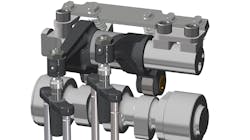Diesel technology that extends life, improves efficiency
While much of the talk these days is about the ascendance of electric vehicles in the trucking industry, the reality is that today there are not viable electric vehicles for all trucking applications. And, of course, there is the whole issue of the charging infrastructure that will need to be put in place before EVs can be put in service for over-the-road hauls. Currently, EVs make sense for short-haul, return-to-base operations, and as terminal tractors. While EV technology will continue to develop, diesel-powered vehicles won't become extinct anytime soon.
“Diesel will continue to be the dominant technology for the foreseeable future,” according to the Diesel Technology Forum.
Government regulations and societal pressures are focusing on reducing emissions from diesel-powered vehicles. Significant reductions have already been realized in particulate matter and nitrogen oxides (NOx). In fact, the Diesel Technology Forum found that 49% of all diesel-powered commercial vehicles in the U.S. are fueled by clean-diesel engine technology. That percentage is likely to rise as older vehicles are replaced with newer, cleaner ones.
In addition, engine and truck makers along with other industry suppliers are continuing to work to make diesel engines more efficient and producing less emissions because they will be on the road for years to come, especially in long-haul and heavy-haul applications. Current battery electric technology is not sufficient to meet the needs of these market segments.
Several technologies under development are available to reduce emissions and decrease fuel consumption of diesel-powered engines. Among those are cylinder deactivation (CDA) and variable valve actuation (VVA). These technologies have demonstrated brake-specific fuel consumption and aftertreatment temperature improvements in all test cycles. The tests also showed significant NOx reductions, especially in the lowest load and cycle work segments.
Many people are familiar with cylinder deactivation because it has been used on passenger cars for decades. As many cylinders as needed can be deactivated, which improves combustion efficiency during periods of low torque demand. CDA also improves emissions because of its higher exhaust temperatures even at low loads.
See also: Cylinder deactivation will help reduce both NOx and CO2 emissions
VVA makes real-time adjustments to valve opening and closing, maintaining accurate control of valve motion. VVA allows the valve timing to be optimized at two operating points, which further reduces fuel consumption during low load operation.
Don't count the diesel engine out just yet. With emerging technologies that are making diesel more efficient while reducing emissions, it will be quite some time before it goes the way of the dinosaurs and becomes extinct.
Robb Janak is director of new technology at Jacobs Vehicle Systems. His objective is to develop technology to meet customers’ future needs. While at Jacobs, Janak accumulated more 25 years of engine brake, valve-train, and variable valve actuation development experience.
About the Author

Robb Janak
Director of new technology at Jacobs Vehicle Systems
Robb Janak is director of new technology at Jacobs Vehicle Systems. His objective is to develop technology to meet customers’ future needs. While at Jacobs, Janak accumulated more 25 years of engine brake, valve-train and variable valve actuation development experience. He began his career at Jacobs in manufacturing support and went on to hold positions in production and product support using Design for Six Sigma and leading Kaizens in Lean Manufacturing. He managed several product development groups and Jacobs’ engineering laboratory where he had responsibility for launching numerous products for OEMs globally.
Janak has contributed to more than 12 U.S. and international patents involving valve train components, systems, and processes. He holds a Bachelor of Science degree in Mechanical Engineering and Materials Science from the University of Connecticut.
